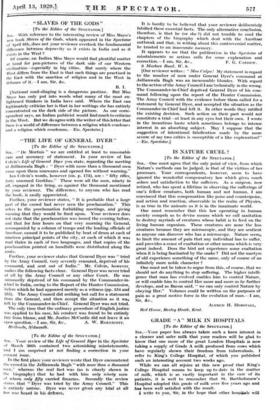"THE LIFE OF GENERAL DYER" [To the Editor of The
SPECTATOR.] Sin,—" Dc Mortuis " we are entitled at least to reasonable care and accuracy of statement. In your review of Ian Colvin's Life of General Dyer you state, regarding the meeting at Jallianwala Bagh : " Dyer with more than a thousand men came upon them unawares and opened fire without warning."
Ian Colvin's words, however (on. p. 173), are : " fifty rifles, forty unarmed Gurkhas." These were all the men, ninety in all, engaged in the firing, as against the thousand mentioned by your reviewer. The difference, to anyone who has read the book, is easily appreciated.
Further, your reviewer states, " It is probable that a large part of the crowd had never seen the proclamation." This refers to the proclamation forbidding meetings, and giving warning that they would be fired upon. Your reviewer dries not state that the proclamation was issued the evening before, and. that for four hours on that very morning the General, accompanied by a column of troops and the leading officials of Amritsar, caused it to be published by beat of drum at each of nineteen principal points of the city, at each of which it was read thrice in each of two languages, and that copies of the proclamation printed on handbills were distributed along the route.
Further, your reviewer states that General Dyer was " tried by the Army Council, very severely censured, deprived of his command, and sent out of India." Mr. Colvin, however, makes the following facts clear. General Dyer was never tried at all by the Army Council or any other Court. He was summarily deprived of his command by the Commander-in- Chief in India, owing to the Report of the Hunter Commission before which he had appeared merely as a witness (pp. 254 and 255). The Army Council did nothing but call for a statement from the General, and then accept the situation as it was left by the Commander-in-Chief. General Dyer was not tried.
The only time that the ordinary procedure of English justice Was applied to his case, his conduct was found to be entirely free from blame, and Mr. Justice McCardie did not leave it an


















































 Previous page
Previous page